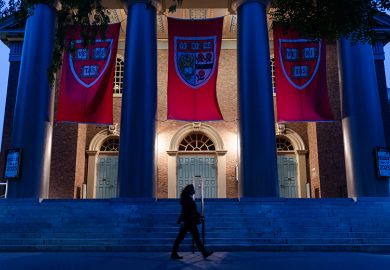Source: Getty
Saving grace: education should not require you to mortgage your financial future
State-backed child savings accounts should be introduced in the US to help pay poorer students’ tuition fees because soaring debt levels are deepening social inequality, a new study says.
In the latest suggestion for a radical break from the federal borrowing model to fund higher education, academics at the University of Kansas argue for a new “asset-based” financial aid system to encourage families to save for their children’s college educations.
It comes as US states increasingly consider alternatives to help fund students’ higher education, such as Oregon legislators’ approval of a pilot scheme that is similar to a graduate tax.
In the study, titled Student Loans are Widening the Wealth Gap: Time to Focus on Equity, William Elliott and Melinda Lewis from Kansas’ School of Social Welfare say that the creation of savings schemes, in which private contributions are matched by the state, would allow graduates to escape higher education relatively debt-free.
Not only would this initiative cut overall student debt levels – currently about $1.1 trillion (£600 million) – but it would help to address social inequality exacerbated by heavy student indebtedness.
For instance, the study reports that the net worth of a household containing a college graduate with student debt is $186,000 less, on average, than a household containing a graduate with no debt, even when loan arrears are discounted.
With a college education widely seen as a “downpayment on the American dream” and “the necessary price to pay for access to promising employment opportunities”, these marked inequalities in graduate outcomes threaten to destabilise the central economic principle of the nation, the report says.
“Higher education plays a critical role in the US economy, creating a ladder of economic opportunity for American children, especially for those in poverty,” it states.
If the education system increases rather than reduces inequalities, it will be a major disincentive for Americans to pursue education or, for some, even to pursue employment, it notes.
The proposed saving scheme is similar to the now-abolished Child Trust Fund in the UK, which was introduced by Labour in 2005 and allocated at least £250 for each baby born since 1 September 2002.
Similar match-funded saving schemes are available for children in North Dakota, Nevada and San Francisco. But powerful players in the student loans business will make it difficult to shift the focus away from a debt culture, the report says.
Sallie Mae, the nation’s largest private student loan lender, reported a net profit of $939 million for 2012, while in 2011 the US Department of Education spent $1.4 billion to pay collection agencies to track down borrowers who are delinquent or in default, the report states.
“This substantial profit creates an incentive structure for some actors, such as the…US Department of the Treasury, commercial banks, and politicians…to maintain the current system of financing college and even expand it when possible,” the report declares.
But “if the American dream is to have real meaning for today’s young people, it should not require mortgaging one’s financial future in pursuit of education”, the report concludes.
Register to continue
Why register?
- Registration is free and only takes a moment
- Once registered, you can read 3 articles a month
- Sign up for our newsletter
Subscribe
Or subscribe for unlimited access to:
- Unlimited access to news, views, insights & reviews
- Digital editions
- Digital access to THE’s university and college rankings analysis
Already registered or a current subscriber?





